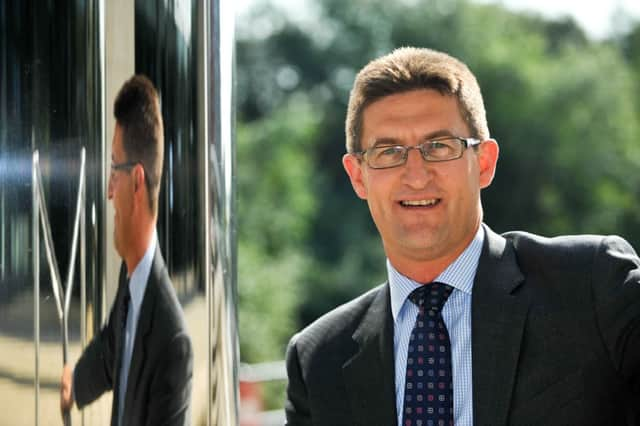Audit veteran who believes Yorkshire is a powerhouse


WITH the General Election looming, a host of political heavyweights are beating a path to Yorkshire, to woo our region’s entrepreneurs.
On the day I met Andy Wood, David Cameron and George Osborne were in our region to highlight the work the Conservative-led coalition has done to boost enterprise.
Advertisement
Hide AdAdvertisement
Hide AdMr Wood can view the county’s political and corporate landscape from a cosmopolitan perspective. Born in the North West and educated in Bury and Bradford, Mr Wood is a fluent French speaker who spent two years on secondment in Paris. As managing partner of Grant Thornton’s Leeds office, he’s keen to ensure that Yorkshire prospers.
In order to secure growth, he feels we ought to rise above regional differences. Leeds and Manchester really should co-operate more to gain maximum political advantage.
“There’s an awful lot of press about devolution, and the Northern Powerhouse,” he said. “We really need to work to ensure we get the very best for the businesses in the region. As a guy who was born and raised in the North West, I can’t help think that we need to look across the Pennines a little bit more often, and try and do things in a much more joined-up fashion along the M62 corridor.
“We have two great cities in Leeds and Manchester, and I’m sure the likes of Hull and Liverpool would like to put their hands up as well.
Advertisement
Hide AdAdvertisement
Hide Ad“I can’t help think that, if we stopped looking with jealousy across the Pennines, and joined forces, joined ideas and joined resources, I’m sure we would be a really powerful Northern bloc.
“All of the election promises currently being made by political parties are dependent on a flourishing business sector that creates jobs and generates the tax revenues needed to fund vital public services.
“I believe that supporting the growth of mid-sized businesses is crucial to this – issues such as addressing the skills gap, reducing red tape, improving access to finance and supporting export, should all be central to any party manifesto.”
Mr Wood is an audit partner with more than 20 years’ experience, who has built up a particularly strong affinity with engineering and manufacturing businesses. These are the firms that form the bedrock of an export-led recovery.
Advertisement
Hide AdAdvertisement
Hide AdHe joined Grant Thornton in 2007 following the merger with RSM Robson Rhodes. His stint in France came in the late 1990s, when he worked as a professional assistant to the chairman of an international audit-based committee.
He recalled: “About 18 months post-qualification, when I was with RSM Robson Rhodes, I got a call from the then senior partner, who was one of my great mentors, to say, “How do you fancy going to live in Paris for two years and travel the globe with RSM?’
“How could I say no? It taught me that people and cultures, and ways of doing things are different in different territories. As a Brit, you’ve got to understand that. You’ve got to absorb and immerse yourself in the local culture. I worked with some large, listed French corporates, who had large subsidiaries in the UK. It opened my eyes.”
In recent years, the accuracy of external audits has come under scrutiny after a number of banks had to be rescued by taxpayers in the 2007-09 financial crisis, just months after the big accounting firms gave them a clean bill of health.
Advertisement
Hide AdAdvertisement
Hide AdThere are also wider concerns about the lack of competition in the auditing sector. Many people feel uncomfortable about the fact that the accounting market is dominated by just four firms – Deloitte, KPMG, PricewaterhouseCoopers and EY. Last year, the Competition and Markets Authority decided that FTSE 350 companies would have to put their audit contracts up for tender at least every 10 years. The ruling, which aims to increase competition in auditing and reduce the dominance of the Big Four, came into force in January. These changes are creating opportunities for Grant Thornton, which already has 192 staff in Leeds.
“I think we can double what we’ve got in the next five years (in Yorkshire) with the opportunities that are starting to open up to our brand,’’ said Mr Wood.
“This whole audit debate is opening up those opportunities to talk to businesses.
“There’s been a merry-go-round of those larger four firms to this point. As we get to know these firms better, perhaps as we do non-audit work for them, the next time these tenders come around, we’ll be ideally placed to really compete with those larger four firms.
Advertisement
Hide AdAdvertisement
Hide Ad“Regulation starts with the FTSE 350, and that starts to trickle down to some really significant AIM listed businesses, or privately owned businesses, who up to this point, have felt they can only speak to the big four about audit or other services. They now want to speak to us as well.
“And in terms of being ‘the category of one’ beneath those four firms, we think that we are a viable alternative to those firms.”
Later this year, Sacha Romanovitch is due to become the chief executive of Grant Thornton in the UK, which shows that not every professional services firm is presided over by a middle-aged male. Mr Wood welcomes this development, which reflects a broader trend towards gender diversity.
“Diversity is right up there on the agenda,’’ he said. “I think it reflects the fact that people come into this profession in very different ways to the way they did in the past.
“We have school leavers, we have interns, and the old-fashioned graduate entrants. The whole profession is evolving constantly; we need to be agile and flexible in the way that we work.”